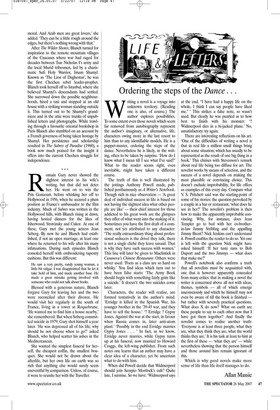Ordering the steps of the Dance . . .
Writing a novel is a voyage into unknown territory. (Reading one is also, of course.) The author explores possibilities. To some extent even those novels which seem far removed from autobiography represent the author’s imaginary, or alternative, life, characters owing more in the last resort to him than to any identifiable models. He is a puppet-master, ordering the steps of the dance. Nevertheless he is likely, in the writing, often to be taken by surprise. ‘How do I know what I mean till I see what I’ve said?’ What to the reader seems right, even inevitable, might have taken a different course.
The truth of this is well illustrated by the jottings Anthony Powell made, published posthumously as A Writer’s Notebook. Though rich in nice observation — ‘A great deal of individual success in life is based on not having the slightest idea what other people are like’ — their chief interest for those addicted to his great work are the glimpses they offer of what went into the making of it. Sometimes you have the first draft of a comment, not yet attributed to any character: ‘The really extraordinary thing about professional seducers is the drivel they talk, there is not a single cliché they leave unsaid. That is why they have such success with women.’ This line will later be given to Maclintick in Casanova’s Chinese Restaurant. Others were never used: ‘Poets as a class are so hard on whisky.’ You find ideas which turn out to have been false starts: ‘The Army Book should begin with something fairly grim like a suicide.’ It doesn’t: the two suicides come later.
Characters, the reader will realise, are formed tentatively in the author’s mind. ‘Erridge is killed in the Spanish War, his younger brother in the ’39-45 war, and they have to sell the house.’ ‘? Erridge ? Gypsy Jones. Against the war at the start, in favour when Russia comes in, later anti-atom plant.’ ‘Possibly in the end Erridge marries Gypsy Jones . . . ’ In fact, as we know, Erridge never marries, while Gypsy turns up at his funeral, now married to Howard Craggs, the left-wing publisher. From such notes one learns that an author may have a clear idea of a character, yet be uncertain what to do with him.
When did Powell decide that Widmerpool should join Scorpio Mortlock’s cult? Quite late, I surmise. So we have: ‘Widmerpool says at the end, “I have had a happy life on the whole, I think I can say people have liked me.” ’ This strikes a false note, so wasn’t used. But clearly he was puzzled as to how best to finish with his monster: ‘? Widmerpool dies in a hi-jacked plane.’ No, unsatisfactory: try again.
There are interesting reflections on his art. ‘One of the difficulties of writing a novel is that in real life a million small things bring about some situation, which has usually to be represented as the result of one big thing in a book.’ This chimes with Stevenson’s remark about real life being too diffuse for art. The novelist works by means of selection, and the success of a novel depends on making the most plausible or convincing choice. This doesn’t exclude improbability, for life offers us examples of this every day. Compare what V. S. Pritchett said was the starting-point of some of his stories: the question provoked by a couple in a bar or restaurant, ‘what does he see in her?’ The novelist’s problem is then how to make the apparently improbable convincing. Why, for instance, does Jean Templer go to bed with her ex-brotherin-law Jimmy Stribling and the appalling Jimmy Brent? Nick Jenkins can’t understand it. Powell enables the reader to do so. Yet one is left with the question Nick might have asked himself: ‘If her taste runs to Bob Duport and the two Jimmys — what does that make me?’ Powell’s notebook also confirms a truth that all novelists must be acquainted with, one that is however apparently concealed from many critics: that in making a novel the writer is concerned above all not with ideas, themes, symbols — all of which emerge unconsciously and which he himself may not even be aware of till the book is finished but rather with severely practical questions. What does X do now? What on earth are these people to say to each other now that I have got them together? And finally the novelist comes to realise another truth: ‘Everyone is at least three people, what they are, what they think they are, what the world thinks they are.’ It is his task at least to hint at the first of these — ‘what they are’ — while nevertheless showing that the person himself and those around him remain ignorant of this.
Which is why good novels make more sense of life than life itself manages to do.
Allan Massie


















































































 Previous page
Previous page